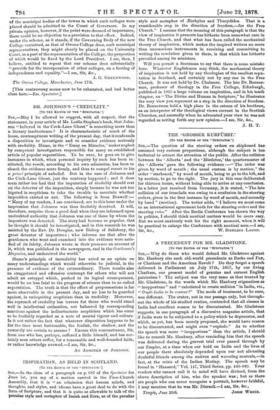LETTERS TO THE EDITOR.
LAST WORDS ON THE NORTHERN UNIVERSITY.
[TO THE EDITOR OF TIER SPROTLTOR.71 Sur,—In his former letter, my friend, Dr. Carpenter, omitted from his sketch of the history of the University of London, as matter on which he thought it " unnecessary to dwell," that one feature of the narrative on which the controversy between us so largely turns,—the early break-down of the semi-collegiate element in the original constitution of the University. I do not think he has been more fortunate in his criticism of the document which I sent him a few days ago. In his strictures on the amount of repre- sentation which it gives to the Crown he has failed to observe two things,—(1) That this " more detailed scheme " is, on the face of it, a paper of suggestions only. It was, in fact, marked "private," as he frankly states, because it could not with pro- priety be made the subject of public discussion until the Lord President, to whom it was addressed, should have expressed his opinion upon it ; (2), that the representation of the Crown on the Executive Body, which would practically direct the Uni- versity, would be, not one in twelve, but one in seven or eight. But apart from this, I submit that the public element is in reality much greater than Dr. Carpenter conceives. The President of the Owens College is, and from the nature of the case will be, a public man ; and the three Governors nominated by him are not likely to be " local " in the same sense in which the life Governors and the representatives of the Senate are. The four Members of Parliament, again (to be chosen from the Members of Parliament for Lancashire, Cheshire, Derbyshire, and Yorkshire), would certainly form a further security for public interests.
The proportion of Governors to be named by the Crown is ob- viously fair matter for consideration, or even for occasional revision, as Dr. Carpenter suggests ; but it is necessary to bear in mind that our principle is that the University should be governed by its Colleges, with a Government element, to see fair-play and to safeguard certain public interests. The University of London, as is well known, has an entirely different raison d'être. Its merits and public services we have often frankly acknowledged ; but unless Dr. Carpenter means that his official experience in the University of London has taught him that its success proves that the establishment of a University of the academical type would be an anachronism, I fail to see that arguments drawn from that experience are altogether relevant.
With regard to the representation of the incorporated Colleges, Dr. Carpenter does not, I think, show that the provisions of our scheme fall short of the requirements of the case. A newly- admitted College, however small, would have exactly the same ex officio representation, both on the Court and on the Executive Body, as Owens College ; and the number of its elected members would, in the words of the Yorkshire memorial, depend only on its " magnitude and efficiency," for this is the obvious interpre- tation of the language of our scheme. Dr. Carpenter's suggestion that, in the face of this provision and in spite of the ultimate sanction of the Lord President, the authorities of the Owens College might contrive to defeat the intentions of the Charter, is surely groundless and gratuitous. It is true that there is no provision that, on the incorporation of new colleges, representatives
of the municipal bodies of the towns in which such colleges were placed should be admitted to the Court of Governors. In my private opinion, however, if the point were deemed of importance, there could be no objection to a provision to that effect. Indeed, under the scheme, as it stands, if the Governing Body of the new College contained, as that of Owens College does, such municipal representatives, they might clearly be placed on the University Court, as a part of the representation of the College, the proportion of which would be fixed by the Lord President. I am, then, I believe, entitled to repeat that our scheme does substantially "provide for the incorporation of other colleges, on a footing of independence and equality."—I am, Sir, &c.,
J. G. GREENWOOD. The Owens College, Manchester, June 17th.
[This controversy seems now to be exhausted, and had better close here.—En. Spectator.]



































 Previous page
Previous page